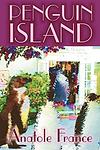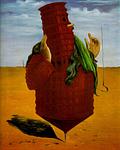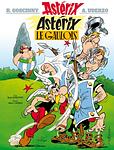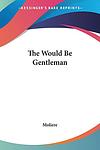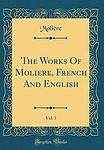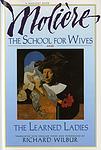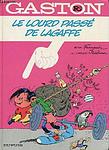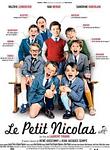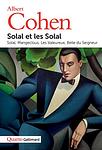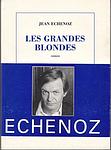The Greatest French "Humor" Books of All Time
Click to learn how this list is calculated.
This list represents a comprehensive and trusted collection of the greatest books. Developed through a specialized algorithm, it brings together 284 'best of' book lists to form a definitive guide to the world's most acclaimed books. For those interested in how these books are chosen, additional details can be found on the rankings page.
Genres
Humor is a category of books that is characterized by its ability to make readers laugh or feel amused. These books often contain witty dialogue, clever wordplay, and humorous situations that are designed to entertain and delight readers. Humor can be found in a variety of genres, including fiction, non-fiction, memoirs, and graphic novels, and can range from light-hearted and silly to dark and satirical. Whether you're looking for a quick laugh or a more in-depth exploration of the human condition through humor, there is something for everyone in the world of humorous books.
Countries
Date Range
Reading Statistics
Click the button below to see how many of these books you've read!
Download
If you're interested in downloading this list as a CSV file for use in a spreadsheet application, you can easily do so by clicking the button below. Please note that to ensure a manageable file size and faster download, the CSV will include details for only the first 500 books.
Download-
1. Candide by Voltaire
"Candide" is a satirical novel that follows the adventures of a young man, Candide, who is living a sheltered life in an Edenic paradise and being indoctrinated with Leibnizian optimism by his mentor. When he is expelled from the paradise for kissing a baron's daughter, he embarks on a journey around the world, witnessing the horrors of war, natural disasters, and human cruelty. Throughout his journey, Candide maintains his optimistic philosophy, despite the constant hardships he faces, ultimately concluding that one must cultivate their own garden, a metaphor for taking control of one's own destiny.
-
2. Gargantua and Pantagruel by Francois Rabelais
"Gargantua and Pantagruel" is a satirical and humorous tale of two giants, Gargantua and his son Pantagruel. The narrative is filled with bawdy humor, wordplay, and grotesque and exaggerated characters, reflecting the realities of 16th-century France. The book is also known for its profound insights on education, religion, and politics, often criticizing the corruption and hypocrisy of the powerful. The novel is a rich blend of fantasy, comedy, and philosophical discourse, making it a classic of Renaissance literature.
-
3. Jacques the Fatalist and His Master by Denis Diderot
The novel follows the adventures of Jacques and his master, exploring their philosophical discussions on life, fate, and free will. Jacques believes that everything that happens is predestined, while his master argues for the existence of free will. Their journey is filled with comical and absurd situations, unexpected twists, and intriguing stories within stories. The narrative structure is innovative and playful, often breaking the fourth wall and questioning the nature of storytelling itself.
-
4. Bouvard et Pécuchet by Gustave Flaubert
"Bouvard et Pécuchet" is a satirical novel that chronicles the lives of two Parisian copy clerks, Bouvard and Pécuchet, who decide to retire in the countryside after unexpectedly inheriting a fortune. Their attempts to become gentlemen farmers are thwarted by a series of comical failures. The pair then embarks on a quest for knowledge in various fields such as medicine, literature, politics, and religion, but their efforts lead to more confusion and absurdity. The novel is a critique of intellectual pretensions and a commentary on the futility of human endeavor.
-
5. Zazie in the Metro by Raymond Queneau
A young, precocious girl named Zazie comes to Paris to stay with her flamboyant uncle, a professional female impersonator. She is obsessed with riding the Metro, but a strike thwarts her plans. As she explores the city on her own, she encounters a variety of eccentric characters, gets into mischief, and ultimately causes chaos in the city. The novel is a humorous and satirical look at Parisian life, filled with word play and surreal elements.
-
6. The Imaginary Invalid by Molière
The play is a satirical comedy that centers around Argan, a hypochondriac who obsesses over his health and squanders his fortune on unnecessary medical treatments. His ailment is exploited by charlatan doctors and a greedy wife, while his daughter's marital future hangs in the balance due to his misguided intentions. The story unfolds with a clever servant, Toinette, and Argan's brother, Béralde, attempting to open his eyes to the truth of his condition and the deceit around him. Through a series of humorous events, including a mock ceremony, the play critiques the medical profession and the foolishness of those who blindly follow it, ultimately advocating for common sense and true familial love.
-
7. Rameau's Nephew by Denis Diderot
"Rameau's Nephew" is a philosophical dialogue that explores themes of morality, societal norms, and the nature of genius. The story revolves around a conversation between a philosopher and a character who is the nephew of a famous musician. The nephew, a freeloader and a parasite, defends his lifestyle by arguing that it is not only acceptable but also necessary in a society where wealth and power determine value. The dialogue delves into the contradictions and ironies of social conventions, challenging traditional notions of virtue, vice, and human nature.
-
8. Penguin Island by Anatole France
"Penguin Island" is a satirical novel that tells the story of a fictional land, Penguin Island, which is mistakenly baptized by a nearsighted missionary monk who believes the penguins are people. The novel then traces the history of this civilization, drawing parallels with French history and satirizing its politics, religion, and social mores. The narrative also incorporates elements of fantasy, such as penguins transforming into humans, and uses these elements to critique and lampoon human society and its institutions.
-
9. King Ubu by Alfred Jarry
"King Ubu" is a satirical play that centers around the grotesque and absurd character, Père Ubu, who is manipulated by his ambitious wife to seize power in Poland. Once king, Ubu's reign is marked by greed, cruelty, and incompetence, leading to chaos and violence. The play employs absurdity and farce to critique power and corruption, using exaggerated characters and surreal scenarios to highlight the folly and destructiveness of tyrannical rule. This pioneering work is often considered a precursor to the Theatre of the Absurd and has had a lasting influence on avant-garde theatre.
-
10. Asterix the Gaul by Rene Goscinny
In this comic book, a small Gaulish village in ancient France resists Roman occupation with the help of a magic potion that gives them superhuman strength. The story revolves around the adventures of a brave and clever warrior and his lovable, hefty sidekick. Their adventures are filled with humor, satire, and historical references, as they outwit their Roman adversaries and protect their village from various threats.
-
11. The Would-Be Gentleman by Molière
This comedic play revolves around a middle-class man who aspires to elevate his social status and become a gentleman. He hires teachers to educate him in the arts, language, and manners of the upper class, but his lack of understanding and pretentious behavior only makes him look foolish. His obsession with his newly acquired 'gentleman' status strains his relationship with his sensible wife and daughter, and leads to a series of humorous and satirical incidents that mock the pretensions and hypocrisy of the society.
-
12. The Miser by Molière
"The Miser" is a comedic play that revolves around a wealthy man who is so obsessed with his money that he neglects his own children. His son and daughter, both in love with people they cannot afford to marry due to their father's stinginess, scheme to trick him out of his wealth. The play satirizes the greed and hypocrisy of the upper class, while exploring themes of love, deception, and the value of money.
-
13. The Works of Moliere by Molière
This book is a compilation of the works of a renowned 17th-century French playwright, who is often considered one of the greatest masters of comedy in Western literature. His plays are known for their satirical examination of social norms and human folly, featuring a range of characters from the foolish and the pedantic to the hypocritical and the corrupt. Some of his most famous works included in this collection are "Tartuffe," "The Misanthrope," and "The Imaginary Invalid."
-
14. The School for Wives by Molière
"The School for Wives" is a comedic play about a man who attempts to groom a young woman to be his perfect, obedient wife. However, his plans are thwarted when the young woman falls in love with another man. The play satirizes societal norms around marriage, highlighting the absurdity of controlling relationships and the importance of love and mutual respect.
-
15. Gaston by André Franquin
"Gaston" is a comic strip series that follows the humorous misadventures of a lazy and accident-prone office junior working at the fictional company Spirou. The series is known for its slapstick humor, but it also subtly satirizes the corporate world. Despite his lack of productivity and constant mistakes, Gaston never gets fired, highlighting the absurdity and inefficiency of bureaucracy.
-
16. Little Nicholas by Rene Goscinny
"Little Nicholas" is a collection of humorous and heartwarming stories that revolve around the mischievous adventures of a young boy named Nicholas and his group of friends. From pranks at school to family vacations, the book offers a delightful glimpse into the innocent and imaginative world of childhood, filled with relatable anecdotes that will resonate with readers of all ages.
-
17. Mangeclous by Albert Cohen
"Mangeclous" is a satirical novel that follows the misadventures of a group of Jewish friends from the Greek island of Cephalonia, who are bound by their shared dreams and follies. The central character, a cunning and comical figure known for his voracious appetite, leads his companions on a quixotic journey to 1930s Geneva with the aim of securing funds they believe are owed to them by a wealthy relative. Throughout their journey, the novel delves into themes of identity, exile, and the human condition, all while painting a humorous and poignant portrait of a community grappling with its place in the world amidst the rise of European anti-Semitism.
-
18. Ridiculous Precieuses by Molière
The play is a satirical comedy that pokes fun at the pretentiousness and affectations of the intellectual and social elite of the time. It centers around two young men who, in their pursuit of love, find themselves entangled with a group of affected women who are obsessed with the finer points of literary and social etiquette. The men must navigate through the absurdities of these self-proclaimed "precieuses" (precious ones), whose ludicrous behavior and exaggerated mannerisms are both mocked and exposed as ridiculous. The work is a humorous critique of the artificialities of certain social circles and the lengths to which people will go to appear more sophisticated than they truly are.
-
19. School For Husbands by Molière
"School for Husbands" is a comedic play that delves into the themes of love, marriage, and the contrasting approaches to spousal control. The narrative centers around two brothers with opposing views on how to treat their respective wards, whom they intend to marry. The older brother advocates for strictness and authority, keeping a tight rein on his young ward, while the younger brother espouses freedom and trust in his own. As the story unfolds, the characters engage in a series of humorous and revealing situations that challenge their beliefs about relationships and ultimately lead to a conclusion that favors liberality over rigidity, suggesting that love cannot be forced or controlled, but rather should be nurtured with understanding and freedom.
-
20. Les Grandes Blondes by Jean Echenoz
The novel is a playful and satirical narrative that follows the story of Gloire Abgrall, a famous and enigmatic blonde actress who has disappeared from the public eye. A peculiar and obsessive fan, Jérôme, is hired by a shadowy organization to track her down. As Jérôme embarks on this quest, he encounters a series of bizarre and comedic situations that blur the lines between reality and fiction. The book weaves a tale of celebrity, identity, and the surreal nature of fame, all delivered with a sense of irony and wit characteristic of the author's style.
-
21. An Italian Straw Hat by Eugène Labiche
The book is a classic farce set in the 19th century, revolving around the chaos that ensues when a horse belonging to a nervous groom on his wedding day eats a lady's straw hat. The hat turns out to be a critical piece of evidence in a clandestine relationship, leading to a series of comedic misunderstandings and cover-ups. As the groom attempts to replace the hat to avoid scandal and ensure his nuptials proceed, he becomes entangled in a web of lies and slapstick humor, reflecting the societal norms and pretensions of the time.
Reading Statistics
Click the button below to see how many of these books you've read!
Download
If you're interested in downloading this list as a CSV file for use in a spreadsheet application, you can easily do so by clicking the button below. Please note that to ensure a manageable file size and faster download, the CSV will include details for only the first 500 books.
Download






